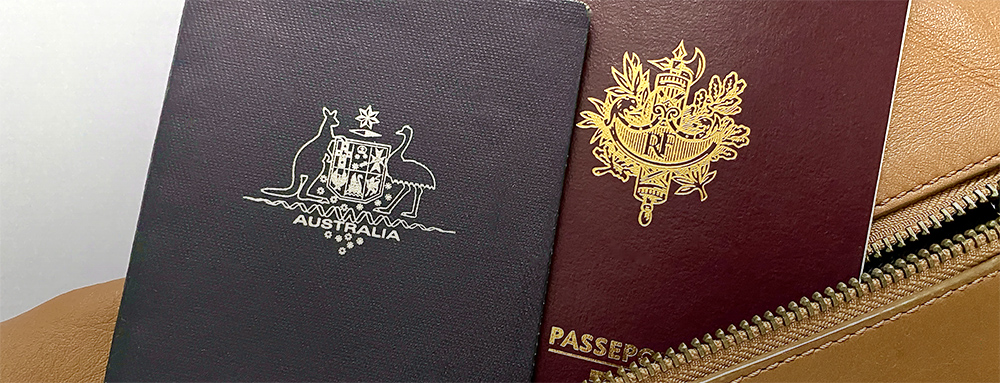Read this page in another language: العربية , 中文 简体, 中文繁體, Bahasa Indonesia, 日本語, 한국어, Tiếng Việt, ภาษาไทย.
This page is for Australians with more than one nationality.
Explore this page to learn about:
- what is a dual national?
- passports and visas
- compulsory military service overseas
- access to healthcare overseas
- marriage, divorce and child custody
- consular services for dual nationals
What is a dual national?
A dual national holds nationality in more than one country.
Whether you're a dual national depends on the laws of Australia and the other country.
You could be a dual national if you:
- have a parent who is a national of another country
- marry a national of another country
- apply for and receive citizenship of another country
- were born overseas.
A country can view you as a national even if you don't accept it. Many won't let you give up your nationality. Some only let you give it up through a formal process.
Some countries don't recognise dual nationality.
Before you travel, check with the country's embassy or consulate if:
- you think you may be a national
- they expelled you in the past. They may not allow you back in.
Passports and visas
An Australian passport is the best proof of Australian citizenship overseas.
Leaving and entering Australia
Use your Australian passport when going in or out of Australia.
You may have issues coming into Australia on a foreign passport. Airlines may not let you board a plane to Australia without either
- proof of Australian citizenship
- an Australian passport
- a valid visa.
You can travel on another country's passport once you leave Australia.
Read more about citizenship and travel.
Entering and leaving your other country of nationality
You can enter and leave your other country of nationality on that country's passport.
If you use that country's passport, local authorities may not view you as Australian. This can limit the Australian government's ability to help you.
Some countries have rules for exiting nationals. You may need an exit permit or visa.
Check with the embassy or consulate of your other country before you travel.
Compulsory military service for dual nationals
Some countries require their citizens to do military service. You may have to serve if you visit the country.
Your other country may let you visit briefly without starting military service. Or you may have to start as soon as you arrive.
You're breaking the law if you don't do your military service. They may arrest you as a defaulter. Even if you're past the age for military service.
Check your military service duties with your other country's embassy or consulate. Get this advice in writing before leaving Australia. Take a copy with you.
Access to healthcare overseas
Some countries may let you use public healthcare as a national. But being a national doesn't always mean you can use local services. Particularly if you don't live or pay tax there.
Get travel insurance that covers healthcare. Even if you're going to a country where you hold nationality.
Read our travel insurance advice.
Marriage, divorce and child custody
Dual nationality can make marriage, divorce and child custody more complicated.
- Australia recognises marriages done overseas if they meet Australian laws. But some agencies won't accept a foreign certificate as proof of a name change.
- Marriages done in Australia aren't always recognised in other countries.
- Some countries don't recognise divorces settled in Australia.
Ask your other country's embassy or consulate if you're concerned about your marriage or divorce being recognised.
Dual nationality can affect court decisions about child custody. Particularly if one parent wants to leave Australia.
You must have the other parent's consent to leave Australia with your children. You could be charged with child abduction if you don't.
Read our advice on getting married overseas and travelling with children. Also, see advice about marriage (Attorney General's Department).
Consular services for dual nationals
Dual nationality can impact how and when we can help you overseas. If you're in your other country of nationality, their government may not let us help you.
If you need help overseas, contact local resources first. You may be able to access support as a national.
The Consular Services Charter explains how we can help Australians overseas.
What we can do in your other country of citizenship
- We can provide Australian passport services.
- We can legalise documents.
- We can give you a list of local English-speaking doctors or lawyers.
What we can't do in your other country of citizenship
- We can't provide consular help if their government doesn't view you as Australian.
- We can't get you out of military service. Or out of jail if you've been charged as a defaulter.
- We can't get you out of trouble if you've been arrested.
- We can't give you legal advice.
Read next
- See our advice about Australian Passports.
- Read more on travelling with children.
- Learn more about getting married overseas and forced marriage.
- See our advice on taking care of your health.
Read more
- Read and subscribe to the travel advice for your destinations.
- See the CHOICE travel insurance buying guide.
- Read the Consular Services Charter to learn how and when we can help.
- Learn what to do when things go wrong overseas.
See also
- Learn about passports for dual nationals.
- Find more about Australian citizenship.

